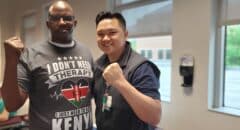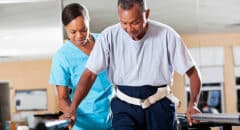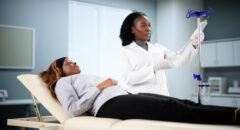
Stroke is a leading cause of long-term disability in the United States, according to the American Heart Association. Blacks are 50 percent more likely to suffer a stroke than whites, but sitting tai chi provides stroke survivors with recovery benefits similar to those achieved with standard rehabilitation, a new study finds.
RELATED: You’ve Survived the Stroke Now What?
How does tai chi help?
Tai chi involves a series of slow movements of the hands, arms, neck, legs and core combined with deep breathing. Researchers developed a tai chi routine that stroke survivors can do while sitting.
"Tai chi has a long history as a form of exercise in China," says lead author Jie Zhao, a lecturer at Yunnan University of Traditional Chinese Medicine, in China. "We revised the tai chi movements for people who have weakness or partial limb paralysis. It is tailored so that participants can move one arm with the help of the healthy arm."
More research is needed to determine the health benefits of tai chi. However, according to the Mayo Clinic, evidence indicates that tai chi may also help:
- Enhance quality of sleep
- Enhance the immune system
- Help lower blood pressure
- Improve joint pain
- Improve symptoms of congestive heart failure
- Improve overall well-being
- Reduce risk of falls in older adults
The new study included 160 adults (average age: 63) in China who had suffered their first ischemic stroke within the past six months and still had the use of at least one arm. (Ischemic stroke is one caused by blocked blood flow in the brain.)
Half of the participants were assigned to the sitting tai chi program and half to a standard stroke rehabilitation exercise program that included recommended upper limb movements (the "control" group).
After three months, patients in the tai chi group had equal or greater improvement in hand and arm strength, shoulder range of motion, balance control, symptoms of depression and activities of daily living than those in the control group, the study found.
The report was published online April 7 in the journal Stroke.
The findings showed that sitting tai chi is an effective option to improve stroke survivors' balance, coordination, strength and flexibility, according to Zhao.
Zhao plans a follow-up study to measure the long-term effects of sitting tai chi.
Life after Stroke: Tips for Recovering Communication Skills
How to do tai chi
"Sitting tai chi can be practiced in a chair or wheelchair and is very convenient since it can be done in your home. The program costs almost nothing to practice, and it doesn't require any special equipment or travel time," Zhao says.
"People will most likely need to adhere to the sitting tai chi exercise beyond 12 weeks to get the beneficial long-term effects," Zhao adds.
Tai chi is slow and gentle, and generally doesn't have negative side effects. However, you can get injured if you don't use the proper techniques so it is important to talk with your doctor and find a qualified tai chi instructor before getting started.








